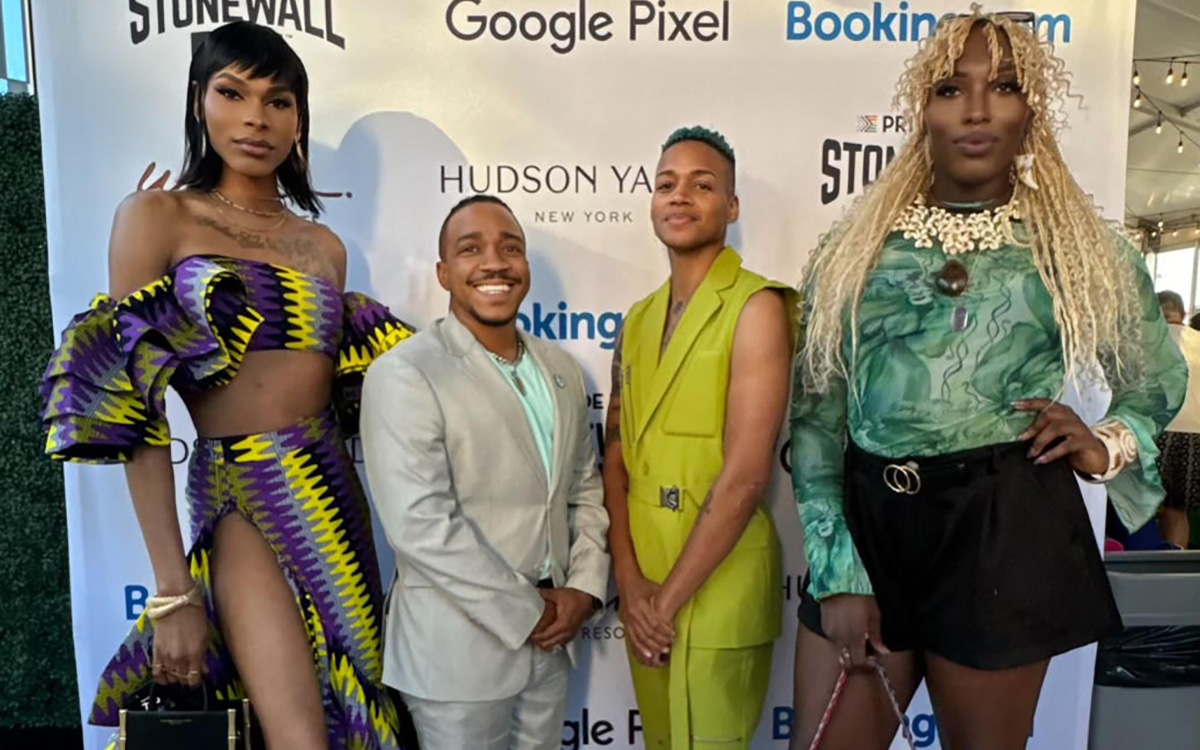News
Mattis claims (dubiously) Joint Chiefs had no input on trans service
Former defense secretary defines anti-trans restrictions he endorsed


Former Defense Secretary James Mattis continues to defend the transgender military ban, making a dubious claim the military service chiefs had no input when openly transgender service was implemented during the Obama years.
Mattis made the remarks in an interview with Time Magazine on the publication of his book, “Call Sign Chaos” in response to a question about why he agreed to roll back policy allowing transgender people to serve in the military.
Although President Trump tweeted he’d ban transgender service members “in any capacity,” Mattis said the new policy was “not a roll back; it was a study.”
Mattis, in apparent reference to the six-month study he was carrying out on transgender service as Trump made the anti-trans tweets, said the policy he proposed “was absolutely a study” based on concerns he said the Joint Chiefs brought up with him.
The military service chiefs, Mattis said, brought up concerns about allowing transgender people into basic training and told him “we’re not ready.”
“I said, ‘What do you mean you’re not ready? Do you have any guidance on what the expectations are? Well, where was your input?’ Mattis said. “They said we didn’t have input.”
It should be noted that when Defense Secretary Ashton Carter announced in 2016 the military would lift the medical regulations banning transgender service and begin its policy of allowing openly transgender people into the armed forces, none of the military service chiefs were present at the news conference.
Mattis said he called for the study on transgender service because he didn’t want to sacrifice the readiness of the armed forces. (Transgender advocates would say the addition of an estimated 14,700 transgender people in the military enhances readiness.)
“I am not going to lose any military efficiency or effectiveness,” Mattis said. “And that’s why I called for a study. And then I just need to leave it there because it’s in courts right now and I shouldn’t be addressing things when I’m no longer privy to the ongoing discussions or where the policy is at.”
Mattis said he was couching his remarks because litigation challenging the transgender military ban remains pending. Although the U.S. Supreme Court essentially issued a green light allowing the Trump administration to implement the ban, the process of litigation continues in lower courts.
The study Mattis conducted resulted in his recommendation to restrict the military service of transgender people in a policy that essentially amounts to a ban. Although transgender people who came out under the Carter policy can remain in the armed forces, transgender people now face significant barriers in enlisting in the armed forces and those who are diagnosed at a later time are now discharged.
Aaron Belkin, director of the San Francisco-based Palm Center, said in a statement Mattis “continues to bury his head in the sand when the health and unity of the nation are at stake,” placing any blame on lack of readiness on the feet of the military service chiefs.
“When it comes to transgender military service, Secretary Mattis asserted falsely that the Service Chiefs had no input into how new transgender recruits would be integrated into basic training,” Belkin said. “In fact, the Chiefs were put in charge of applying transgender policy to the basic training environment, and they were given an entire year to figure it out. They didn’t do anything and then complained about it when the deadline came.”
Mattis’ remarks are similar to comments he gave in Senate testimony defending the transgender military ban in a moment when he clashed with Sen. Kirsten Gillibrand (D-N.Y.). At the time, Gillibrand had recently gotten all service chiefs on the record saying transgender service has resulted in no incidents of unit disruption, but Mattis insisted reports of that nature wouldn’t have reached them.
Referencing the favorable testimony the military service chiefs gave Gillibrand on transgender service, Belkin concludes Mattis continues to miss the mark.
“As he has on other issues, Mattis seems to want to have his status as a Trump critic without renouncing any of the Trump policies he put into practice,” Belkin said.
Mattis resigned as defense secretary under the Trump administration following an announcement from Trump he’d remove all U.S. soldiers from Syria, which was criticized as a hasty decision and influenced by Turkey President Recep Tayyip Erdogan. Trump has since reversed himself on that decision.

It is common knowledge that women earn 84% of the average worker. Less common knowledge? Trans women earn 60% of the average worker. Trans men and non-binary people come in at around 70%, while 16% of all trans people make less than $10,000 annually.
E.C. Pizarro was lucky, and he knew it. He had a BFA in graphic design and had taught himself how to code. As a stealth trans man in a corporate job, he had access to a stable wage and good benefits. “People that do not have experiences in corporate America or with equitable employment don’t realize [these things] are privileges that a lot of people don’t have access to.”
He wanted to give back and was gearing up to bring more volunteer work into his life by participating in a fraternity for trans men. When he went to a TransTech event and learned about the educational and career resources for trans people who face barriers to entering the workforce, he knew he had found his place.
At the event he met, Angelica Ross. Yes, that Angelica Ross, of “Pose” and “American Horror Story.”
Before she was Candy, Ross was a self-taught coder. She went from posing for an adult website to doing its back-end coding to teaching her trans siblings how to succeed in tech.
“Technology was the key to my freedom,” Ross said in an interview with The Plug. “Technology took me from being exploited on someone’s website to building my own websites and to building websites for other people and getting paid to do so.”
Pizarro was impressed and wanted to help. “I went up to Angelica and I was like ‘Hey, I’m a trans man. These are my skills. I’m down to volunteer and do any type of work—the one caveat is that I’m stealth. You can’t tell anybody that I’m trans.’”
For four years, Pizarro helped from mostly behind the scenes, sometimes getting side-eyed since people thought he was a cis man in trans spaces. “I was still stealth as the Director of Social Media and Communications for the National Trans Visibility March in 2019,” Pizarro says, chuckling a little.
But by that point, Ross — who headlined the 2019 march — was overextended trying to balance being a world-famous actress, advocate, and businesswoman.
She needed someone to step in as executive director of TransTech and looked to the group of dedicated volunteers. Pizarro was elected by his peers to take the reins of the organization.
This was a turning point for Pizarro. “I’m very passionate about tech and for me a small sacrifice of being open with my trans experience to liberate other trans people,” he said. “I felt like if that’s something I got to do, then I’m gonna do it.”
And he did it. The infrastructure Ross put together worked: with mentorship, education, community, and networking with trans-accepting employers, trans people were gaining financial security and independence.
So, Pizarro focused on expanding TransTech as widely as possible. “We have grown exponentially over the last three years,” he says. “When I took over in 2021, we had about 800 members based in the United States. Now we support over 6,700 members across 50 countries.”
TransTech is filling a demonstrated need within specifically the trans community. New research from LGBT Tech found that 68% of transgender adults use the internet to find LGBTQ-friendly employment (compared to 38% of cisgender LGBTQ+ adults). More than 70% of all LGBTQ adults use the Internet to access educational content.
Accessibility is central to the TransTech programming. Despite the growth, everything remains free. “There’s no membership fee. All of our programming is free. All of the certifications and educational resources are free,” Pizarro says.
They know the financial burden the trans community faces — 29% of trans adults live in poverty. “If we’re asking anyone to up-skill [for a cost] and these are the things they are going through, we are asking them to invest in their future versus their meal today.”
Pizarro believes that accessibility is more than just making the training free. He wants the community to understand that tech work is something they are innately capable of doing.
“TransTech was built on the foundation of nontraditional tech. It’s not always coding. It’s graphic design. It’s social media. It’s video editing. It’s anything that uses a piece of technology and nowadays almost everything uses a piece of technology,” says Pizarro.
He emphasizes to participants: “You’re in tech and you don’t even know it,” pointing out how many already utilize tech skills like marketing and monetization with their social media accounts.
Some people involved in the programming are nervous about entering the “tech world” because of headlines about tech layoffs. He makes sure to emphasize that unlike in some other jobs, tech companies often pay generous severance packages, which gives employees “breathing room.” Pizzaro explains that “once you have experience with one tech company, you can go someplace else and make a substantial amount of money as well.”
While TransTech is designed for the gender-diverse community, the programming is open to everyone Pizarro explains. “We just ask that you don’t be transphobic.” (Or any of the other -phobics too, he says, listing them off.) He also emphasizes that this allows trans members who are not out to comfortably participate.
Pizarro wants everyone to understand that they don’t just belong in tech, but they make tech better. “Tech is most profitable when you have diverse people building the tech and using the tech,” Pizarro says. “There is an intentional funding as well as support to diversity tech because they understand how that impacts the product.”
He also reminds participants that they have developed transferrable skills in every part of their lives. “I like to tell people if you can manage your life as a trans person in the United States or anywhere you can manage a project.”

District of Columbia
Fire by arson forced temporary shutdown of Glorious Health Club
Spa and art gallery catering to gay
men expects to reopen in August

In a little noticed development, D.C.’s Glorious Health Club, which bills itself as a spa, art gallery, and community center catering to gay men, was forced to close on May 19 after one or more unidentified suspects ignited a fire inside the club that D.C. fire department officials have ruled an act of arson.
Robert Siegel, the club’s owner, told the Washington Blade that he and investigators with the D.C. Fire and Emergency Medical Services Department believe one or more yet unidentified suspects broke into the kitchen of the former warehouse building where the club is located at 2120 West Virginia Ave., N.E.
According to Siegel, investigators with the fire department’s arson squad believe a flammable liquid was used to start the fire in the kitchen and in two other locations within the building.
“Three separate fires were started,” Siegel said. “They started one on a staircase and one on the upstairs storage area,” he said in addition to the one in the kitchen. He said about 40 patrons were in the club at the time the fire started, and all were able to leave without injury.
Siegel said the fire caused $500,000 worth of damage to his building, with some of the damage caused — understandably he said — by fire fighters who had to rip open doors and break through the roof to gain access to the flames that engulfed parts of the interior of the building. He said he arranged for repair work to begin after the fire was extinguished.
“I expect we’ll be reopening in about a month from now,” he said. “And we’ll be a bigger and better place.”
Fortunately, Siegel said, most of the artwork and art exhibits located in the club were not damaged.
“It was basically the kitchen, patio, and the roof,” he said, adding that much of the solar panels he had on the roof were destroyed by the fire or by firefighters seeking to gain access to the building.
“And the fire was so hot it did structural damage to the roof,” he said. “It actually melted steel. We’re talking about 50-foot steel beams that have to be replaced,” he told the Blade. “That’s $100,000 right there.”
Vito Maggiolo, a spokesperson for the D.C. Fire and Emergency Medical Services Department, said the fire was “ruled incendiary/arson” and is “under active investigation.”
It could not immediately be determined if one or more people responsible for the fire targeted the Glorious Health Club because it’s a gay community establishment.
South America
Chilean capital Pride parade participants, activists attacked
Men wearing hoodies disrupted June 29 event in Santiago

A group of hooded men on June 29 attacked LGBTQ activists and others who participated in the Chilean capital’s annual Pride parade.
Witnesses said the men punched and kicked activists and parade participants, threatened them with a skateboard, threw stones and paint at floats and damaged parade infrastructure. The men also broke a truck’s headlight.
The Movement for Homosexual Integration and Liberation, a Chilean LGBTQ rights group known by the acronym Movilh, strongly condemned the acts of violence, calling them deliberate attempts to disrupt a peaceful and safe demonstration.
“Vandalism that seeks to transgress the peaceful trajectory of our demonstrations and that is only useful to the interests of the homo/transphobic sectors,” denounced Movilh.
The attack occurred when the hooded men tried to break through the security fence protecting the participants and the truck that was at the beginning of the parade.
“As we do every year, we fence the truck with our volunteers to prevent anyone from being run over or hurt by the wheels,” said Movilh. “The hooded men approached the fence to break it, hitting our volunteers and people outside of our organization with their feet and fists who, in an act of solidarity, tried to dissuade them.”
The motives behind this attack seem to be related to previous calls on social networks to boycott the event, although the organizers stressed that violent acts are alien to the parade’s inclusive and celebratory purpose.
Movilh spokesperson Javiera Zúñiga told the Washington Blade that “after the attack that we faced during the Pride March, we published in our social networks the few images that were available from that moment.”
“What we are basically asking is that anyone who has seen something and can recognize any of the aggressors write to our email or (contact us) through our social networks so that we can file complaints and do whatever is necessary to find those responsible.”
Zúñiga stated that “not only was there aggression against people, but there was also damage to private property because they broke one of the truck’s headlights.”
“So for these two reasons we are looking for anyone who may have information to contact us,” she said.
The incident has generated widespread condemnation within the LGBTQ community and outside of it. They say it highlights the need to protect human rights and diversity and promote respect for them.
-

 Canada2 days ago
Canada2 days agoToronto Pride parade cancelled after pro-Palestinian protesters disrupt it
-

 Baltimore4 days ago
Baltimore4 days agoDespite record crowds, Baltimore Pride’s LGBTQ critics say organizers dropped the ball
-

 Sports5 days ago
Sports5 days agoHaters troll official Olympics Instagram for celebrating gay athlete and boyfriend
-

 U.S. Supreme Court1 day ago
U.S. Supreme Court1 day agoConcern over marriage equality in US grows two decades after first Mass. same-sex weddings








